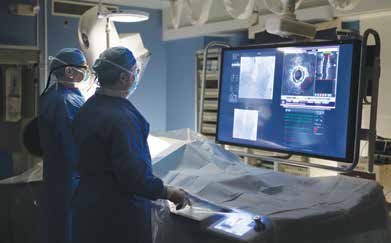
Cardiac Partners Interventional Cardiologists Janah Aji, MD, FACC, and Kurt W. Kaulback, MD, FACC, in the catheterization lab at Cooper University Hospital.
Understanding Structural Heart Disease
Structural heart disease refers to an abnormality of the heart’s valves or muscular structure that can be present at birth or may develop later in life as part of aging. Because this type of abnormality affects the function of the heart, serious health complications can occur if it is left untreated.
Some common types of structural heart disease:
- Aortic Stenosis is a common, yet serious heart valve disease that involves narrowing of the valve that opens into the aorta. This narrowing typically occurs with age as a result of calcium buildup or being born with a bicuspid aortic valve (two leaflets instead of three). Blood flow becomes restricted, causing the heart to work harder than normal, which can lead to fatigue, shortness of breath, and ultimately heart failure.
- Left Atrial Appendage (LAA) Clots can form in the left atrial appendage, a small pouch in the left upper chamber of the heart where blood can collect and form a clot. The clot can travel out of the heart, potentially causing a stroke. Those with atrial fibrillation or mitral valve disease are at higher risk for this condition.
- Mitral Valve Regurgitation occurs when the mitral valve doesn’t close as tightly as it should, allowing blood to flow backward in the heart towards the lungs. Those who are affected often experience fatigue and shortness of breath. This condition can also lead to a heart rhythm disorder or heart failure.
Less Is More: Treatment Options for Structural Heart Disease
Cardiac Partners provides a full range of minimally invasive (nonsurgical) treatment options. “As a high-volume cardiac center that has received national recognition for superior quality of care and a team of world-renowned cardiovascular experts, Cooper has been fortunate in having the opportunity to continue to be a regional leader in clinical trials and innovative treatment options,” said Sajjad A. Sabir, MD, Director of the Cooper Structural Heart Disease Program and Heart Valve Clinic. “Through the collaboration with our colleagues at Inspira, the Cardiac Partners team is able to serve more patients throughout South Jersey, providing access to the latest diagnostic testing, arrhythmia management, nonsurgical procedures, cardiac surgery, and cardiac rehab.”
The many benefits of nonsurgical cardiac procedures include:
- Less trauma to the body
- Less pain
- Less scarring
- Less risk of infection
- Less time in the hospital
- Less downtime
Nonsurgical Cardiac Procedures
Left Atrial Appendage Closure (LAAC) Device (WATCHMAN®)
The LAAC device procedure is available for patients with atrial fibrillation (AFib) that is not caused by a heart valve problem, who are seeking an alternative to using lifelong blood thinners. The LAAC device is delivered through a catheter-based procedure with access through the groin and implanted in the heart to permanently close off the left atrial appendage, reducing the risk of stroke.
MitraClip® Transcatheter Mitral Valve Repair
This nonsurgical procedure provides a new, minimally-invasive treatment option for patients with severe mitral valve regurgitation, who are too high-risk for traditional open-heart surgery. The MitraClip device is delivered through a catheter placed in the groin and permanently attaches to the mitral valve, reducing the backward flow from the heart towards the lungs and improving normal blood flow in the heart.
Transcatheter Aortic Valve Replacement (TAVR)
The TAVR procedure offers a nonsurgical treatment option to patients with significant aortic stenosis. During this procedure, an artificial valve is delivered through a catheter placed in the groin. It is permanently placed in the heart, allowing the new valve to open properly and improve blood flow.
Click here to learn more.
To schedule an appointment with a Cardiac Partners structural heart expert, call 856.968.7812.
